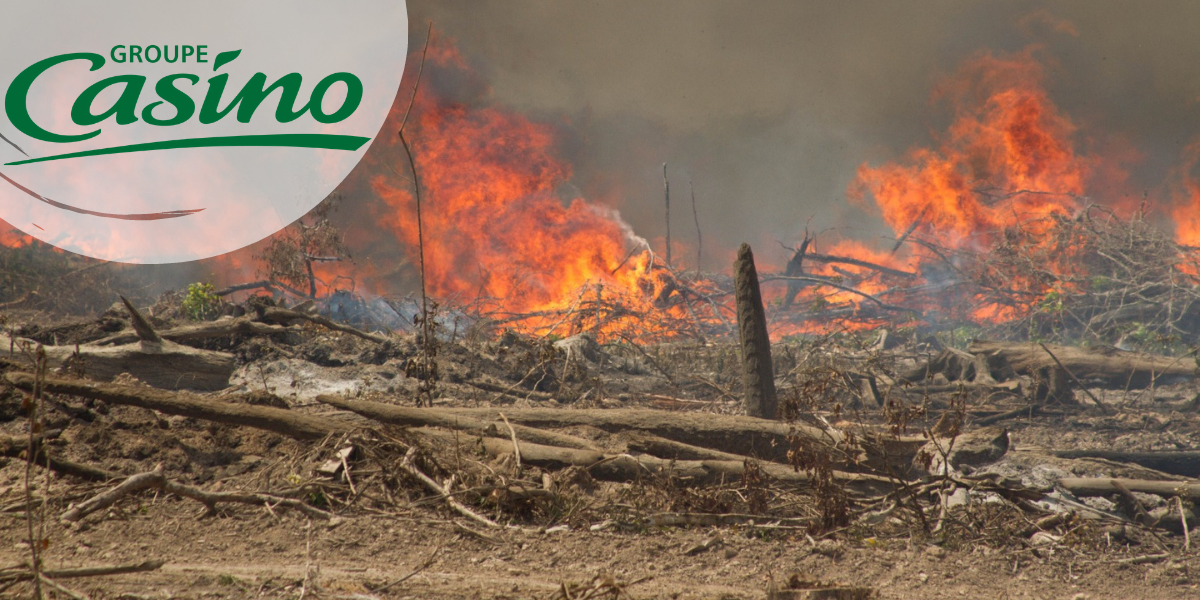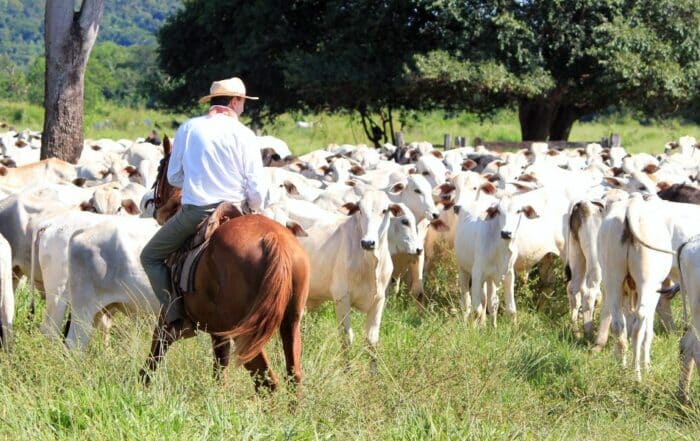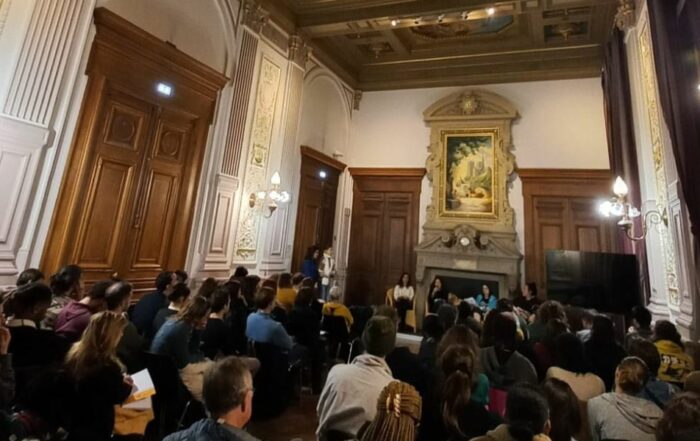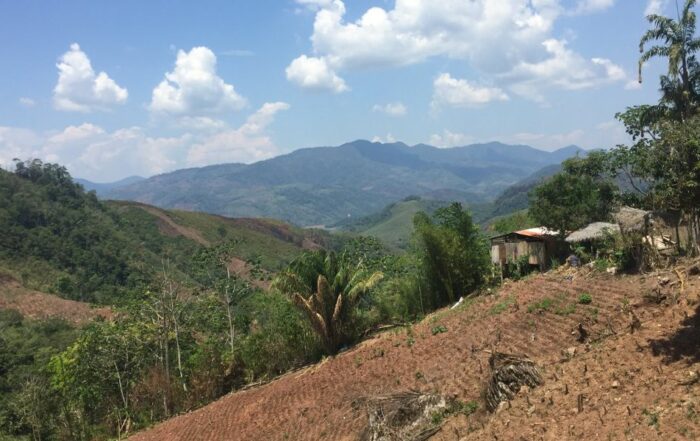Amazon indigenous communities and international NGOs sue supermarket giant Casino/Pão de Açúcar/Éxito over deforestation and human rights violations.
This Wednesday, March 3, 2021, indigenous peoples from the Brazilian and Colombian Amazon and non-governmental organizations from France and the US today filed a lawsuit in the Saint-Etienne court against global retail giant Groupe Casino over selling beef products linked to deforestation and land grabbing.
This is the first time a supermarket chain is taken to court over deforestation and human rights violations under the French due diligence law adopted in March 2017 (“loi sur le devoir de vigilance” in French). Indigenous groups claim compensation for damages done to their customary lands and the impact on their livelihoods.
Environmental destruction and human rights violations
The three slaughterhouses sourced cattle from 592 suppliers responsible for at least 50,000 hectares of deforestation between 2008 and 2020
The lawsuit alleges systemic violations of human rights and environmental laws in Groupe Casino’s supply chains in Brazil and Colombia over a long period of time. According to evidence compiled and analysed by the Center for Climate Crime Analysis (CCCA) for this case, Groupe Casino regularly bought beef from three slaughterhouses owned by JBS, a giant meatpacker. The three slaughterhouses sourced cattle from 592 suppliers responsible for at least 50,000 hectares of deforestation between 2008 and 2020 (1). The deforested area is five times the size of Paris.
Evidence submitted in this lawsuit also shows violations of indigenous rights. In one of the documented cases, customary land owned and managed by the Uru Eu Wau Wau community in the State of Rondônia, Brazil was invaded and put into production by cattle farms supplying beef to Casino’s Pão de Açúcar.
Groupe Casino’s responsibility
The company has dared to write to the plaintiffs that « due to the low number of reports mentioning cattle as a driver of deforestation in Colombia », Casino doesn’t consider it relevant to include the country in the scope of their due diligence plan.
Despite numerous media reports linking Groupe Casino’s products to deforestation and land grabbing, the company has failed to overhaul its monitoring and enforcement policies to ensure there’s no environmental or human rights violations in its entire supply chain. The company has dared to write to the plaintiffs that “due to the low number of reports mentioning cattle as a driver of deforestation in Colombia” Casino doesn’t consider it relevant to include the country in the scope of their due diligence plan. Yet, Colombia has one of the highest rates of deforestation in the world, with cattle being the main cause (2).
In spite of the ever-growing body of evidence linking the world’s biggest meat company, JBS, to deforestation and even slave labour (3), Casino Group still buys from JBS. Furthermore, Groupe Casino has failed to commit to only sell zero-deforestation nor zero-conversion meat in their Pão de Açúcar, Casino or Grupo Éxito stores.
Groupe Casino is the largest supermarket chain in Brazil and Colombia through its brands Pão de Açúcar and Grupo Éxito respectively. Casino’s South American operations account for nearly half (47%) of the group’s global revenues.
France’s Duty of Vigilance law requires France-based companies with over 5,000 employees to take adequate and effective measures to prevent serious human rights and environmental violations in their entire supply chains. Should they fail to do so, they may be held liable and ordered to pay damages.
Amazon’s tipping point
Cattle ranching is the main driver of deforestation in South America, in particular in Brazil. According to Brazil’s space agency (INPE), deforestation of the Amazon rainforest has surged to a 12-year high. The Amazon is in danger of reaching a tipping point of switching from a canopy rainforest to open grassland.
Last December, the Brazilian government removed any measure to tackle deforestation in the national climate action plan (known as an NDC) under the Paris Agreement, although forest loss continues to be the main source of greenhouse gas emissions in the country.
Comments from the plaintiffs
The breadth and diversity of the coalition is testament to the global footprint and the variety of impacts caused by industrial beef production as well as the need for a collective defense.
Coalition’s members are :
Amazon indigenous communities and international NGOs sue supermarket giant Casino/Pão de Açúcar/Éxito over deforestation and human rights violations.
This Wednesday, March 3, 2021, indigenous peoples from the Brazilian and Colombian Amazon and non-governmental organizations from France and the US today filed a lawsuit in the Saint-Etienne court against global retail giant Groupe Casino over selling beef products linked to deforestation and land grabbing.
This is the first time a supermarket chain is taken to court over deforestation and human rights violations under the French due diligence law adopted in March 2017 (“loi sur le devoir de vigilance” in French). Indigenous groups claim compensation for damages done to their customary lands and the impact on their livelihoods.
Environmental destruction and human rights violations
The three slaughterhouses sourced cattle from 592 suppliers responsible for at least 50,000 hectares of deforestation between 2008 and 2020
The lawsuit alleges systemic violations of human rights and environmental laws in Groupe Casino’s supply chains in Brazil and Colombia over a long period of time. According to evidence compiled and analysed by the Center for Climate Crime Analysis (CCCA) for this case, Groupe Casino regularly bought beef from three slaughterhouses owned by JBS, a giant meatpacker. The three slaughterhouses sourced cattle from 592 suppliers responsible for at least 50,000 hectares of deforestation between 2008 and 2020 (1). The deforested area is five times the size of Paris.
Evidence submitted in this lawsuit also shows violations of indigenous rights. In one of the documented cases, customary land owned and managed by the Uru Eu Wau Wau community in the State of Rondônia, Brazil was invaded and put into production by cattle farms supplying beef to Casino’s Pão de Açúcar.
Groupe Casino’s responsibility
The company has dared to write to the plaintiffs that « due to the low number of reports mentioning cattle as a driver of deforestation in Colombia », Casino doesn’t consider it relevant to include the country in the scope of their due diligence plan.
Despite numerous media reports linking Groupe Casino’s products to deforestation and land grabbing, the company has failed to overhaul its monitoring and enforcement policies to ensure there’s no environmental or human rights violations in its entire supply chain. The company has dared to write to the plaintiffs that “due to the low number of reports mentioning cattle as a driver of deforestation in Colombia” Casino doesn’t consider it relevant to include the country in the scope of their due diligence plan. Yet, Colombia has one of the highest rates of deforestation in the world, with cattle being the main cause (2).
In spite of the ever-growing body of evidence linking the world’s biggest meat company, JBS, to deforestation and even slave labour (3), Casino Group still buys from JBS. Furthermore, Groupe Casino has failed to commit to only sell zero-deforestation nor zero-conversion meat in their Pão de Açúcar, Casino or Grupo Éxito stores.
Groupe Casino is the largest supermarket chain in Brazil and Colombia through its brands Pão de Açúcar and Grupo Éxito respectively. Casino’s South American operations account for nearly half (47%) of the group’s global revenues.
France’s Duty of Vigilance law requires France-based companies with over 5,000 employees to take adequate and effective measures to prevent serious human rights and environmental violations in their entire supply chains. Should they fail to do so, they may be held liable and ordered to pay damages.
Amazon’s tipping point
Cattle ranching is the main driver of deforestation in South America, in particular in Brazil. According to Brazil’s space agency (INPE), deforestation of the Amazon rainforest has surged to a 12-year high. The Amazon is in danger of reaching a tipping point of switching from a canopy rainforest to open grassland.
Last December, the Brazilian government removed any measure to tackle deforestation in the national climate action plan (known as an NDC) under the Paris Agreement, although forest loss continues to be the main source of greenhouse gas emissions in the country.
Comments from the plaintiffs
The breadth and diversity of the coalition is testament to the global footprint and the variety of impacts caused by industrial beef production as well as the need for a collective defense.






